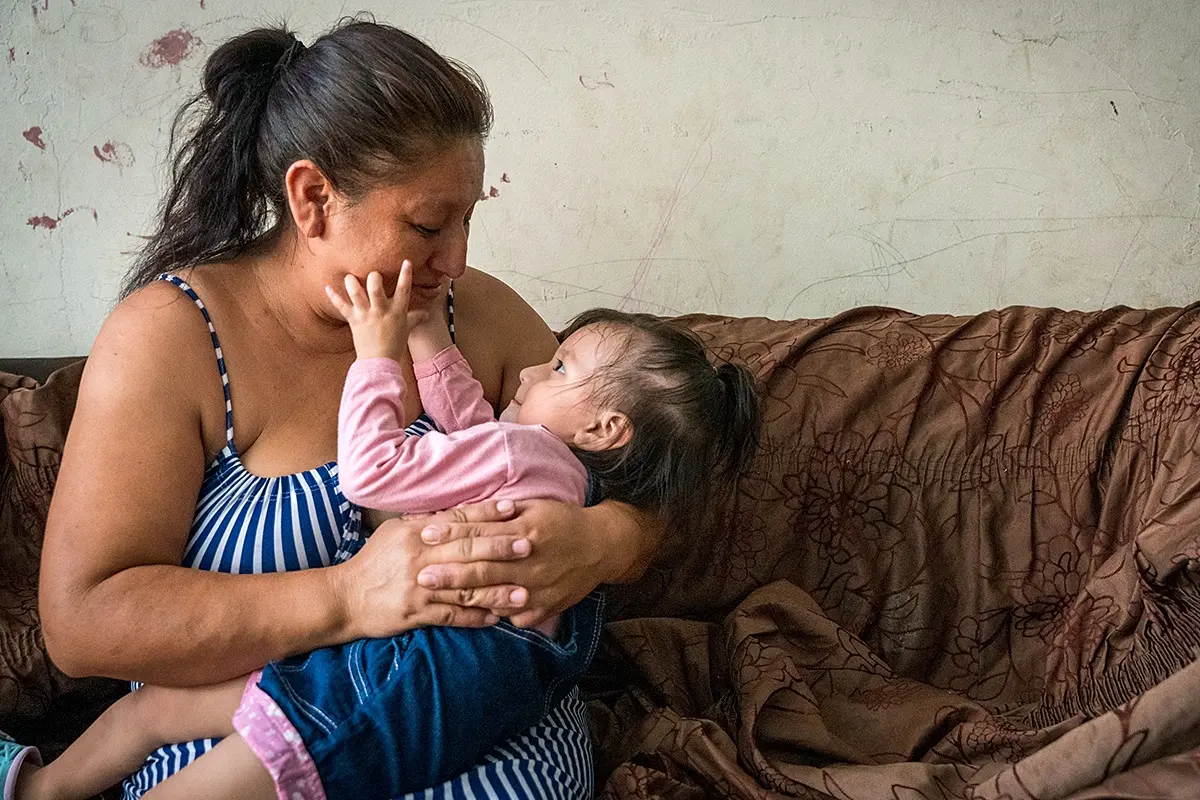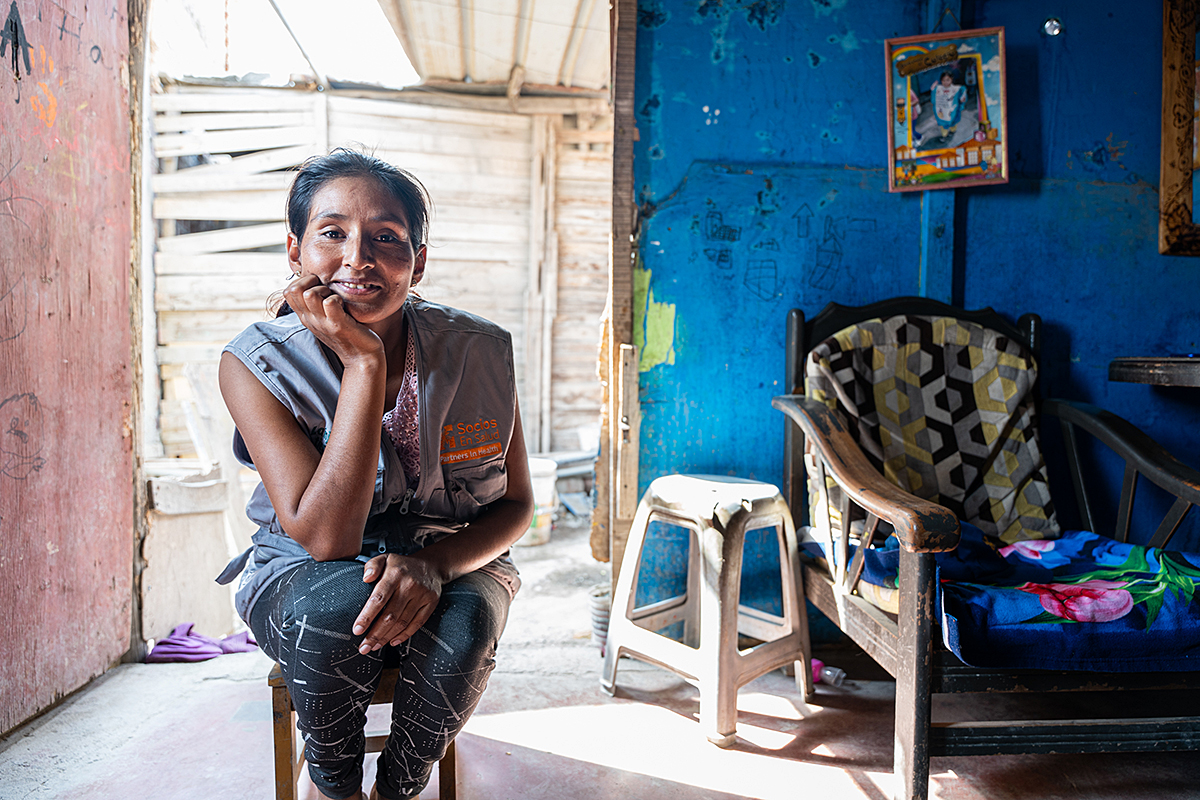Providing Mental Health Care for Pregnant Women and Mothers in Peru
Partners In Health has provided mental health care to pregnant women and mothers in northern Lima since 2018
Posted May 28, 2024
 Leidith Tinoco, a participant in Socios En Salud’s mental health program for pregnant women and mothers — Pensamiento Saludable — cradles her daughter. Photo by Diego Diaz / PIH.
Leidith Tinoco, a participant in Socios En Salud’s mental health program for pregnant women and mothers — Pensamiento Saludable — cradles her daughter. Photo by Diego Diaz / PIH.
Delia Bruno, 32, was in the last trimester for her first daughter when she went to the Juan Pablo II Health Center, located in the district of Carabayllo, north of Lima, late last year. She had previously been to the health center for her prenatal check-up. But now, something felt wrong.
“I was feeling very bad, completely depressed,” she recalls. “When I went in for my check-ups, I was crying [and filled] with sadness. I didn’t see life the way I do now.”
Bruno’s symptoms were similar to those of almost 30% of pregnant women in northern Lima, according to a study by the Mental Health Program of Socios En Salud, as Partners In Health is known in Peru. After a separation from her daughter’s father, marked by signs of infidelity, she struggled to accept the truth. The threat of a miscarriage, due to stress, loomed and did not allow her to see her pregnancy as “a special stage.”
It was then that her gynecologist introduced her to Psychologist María Fernanda Amézquita, head of the Healthy Thinking Strategy—Pensamiento Saludable (PENSA) as is known in Spanish—at Socios En Salud. Amézquita was fortunately visiting the Carabayllo health center that day.
“That’s when I started everything. That’s when the call began,” says Bruno.
In January 2024, Socios En Salud contacted her. Although she admits that she was on the verge of not answering the call—distrusting unknown numbers—she picked up the phone anyway. Today, she is one of 80 women accessing care through PENSA this year, including free therapy and psychological support. Now, after four months of participating, with her 2-month-old baby in her arms, Bruno recognizes that she has seen improvements.
 Delia Bruno holding her daughter. Photo by Diego Diaz / PIH.
Delia Bruno holding her daughter. Photo by Diego Diaz / PIH.
“Right now, I don’t feel one hundred percent well, but I feel good,” she says. “There are days when I relapse and there are days when I feel much better. Little by little, progress is being made.”
Finding Pregnant Women, Uncovering Unmet Need
Socios En Salud has worked in Peru for more than 25 years, starting in response to a deadly outbreak of multidrug-resistant tuberculosis in Carabayllo, a community on the outskirts of Lima. In the years since, it has expanded its programs to provide medical care and social support across a range of clinical areas, including mental health.
Socios En Salud implemented PENSA in 2018, a strategy recommended by the World Health Organization for pregnant women with depression. PENSA started in the Carabayllo community and used materials developed by Atif Rahman, a child psychiatrist and clinical researcher at the University of Liverpool.
“We started the work with eight pregnant women, and everything was face-to-face,” says Amézquita. “At the moment, we have intervened on more than 500 pregnant women.”
The PENSA intervention consists of 16 sessions, divided into modules, that focus on three essential areas: the mother’s health, the mother’s relationship with the baby, and the mother’s relationship with the people around her.
“We try to reinforce these areas so that they can have emotional support from their families and develop a correct emotional bond with their sons or daughters, as well as with themselves,” says Amézquita.
In addition, she states that PENSA actively searches for “women who are having their pre- and post-natal check-ups in health centers and show symptoms of depression,” after obtaining permission from the Ministry of Health.
“We visit health facilities, and we contact pregnant women in person or by phone and invite them to participate in an evaluation for depression with tests recommended by the Ministry of Health,” she says.
This was how Socios En Salud developed PENSA’s pilot. Even before the COVID-19 pandemic, it conducted its sessions with pregnant women and mothers through video calls, or by phone in case of internet coverage issues. When in-person activities resumed, home visits persisted. The program also considered each social determinant—identifying resources that families may need, like vouchers for transportation, food, and social support—which has been key to its overall success.

Susana Gamboa, one of the 22 community health workers trained in Healthy Thinking, conducting a home visit. Photo by Diego Diaz / PIH.
Care, from the Community
Leidith Tinoco, 38, still remembers with gratitude the dedication shown to her by Susana Gamboa, the community health worker that Socios En Salud assigned to her as part of her therapy through PENSA.
“The doctor [what Tinoco calls Gamboa] has been looking out for me. I feel very grateful,” she says.
Community health workers are local residents hired from the communities where Partners In Health works and are trained to provide basic health care, such as delivering medications, checking on patients at home, or accompanying them to their appointments. In Peru, Socios En Salud has 63 community health workers on staff, referred to locally as agentes comunitarios. The PENSA strategy has 22 community health workers, trained specifically on maternal mental health.
Tinoco was pregnant with her fourth child when she joined PENSA in April 2022. She had previously gone to the Centro Materno Infantil El Progreso in Carabayllo, seeking psychological help because she was going through family problems and financial challenges, which caused her to experience negative thoughts about herself.
“There were times when I wanted to disappear, because sometimes I had problems with my husband, (while I was) pregnant. (…) I was very distrustful,” she recalls.
Amézquita and the PENSA team had heard stories like this before. A lack of resources, break-ups with partners, a lack of recognition at home, domestic violence, and unintended pregnancies are often the factors that contribute to depression in pregnant women. It is a difficult path in which they need consistent accompaniment to continue their treatment.
“When moms feel that you are by their side, that helps them more than anything. ‘You are not alone’ is the key phrase,” says Gamboa, who was trained as a community health worker on the PENSA team during the pandemic.
Tinoco attested that, throughout her therapy, Gamboa was always there to listen to her.
 Leidith Tinoco credits PENSA as helping her recover. Photo by Diego Diaz / PIH.
Leidith Tinoco credits PENSA as helping her recover. Photo by Diego Diaz / PIH.
“Sometimes I argued with my partner and called the doctor [Gamboa],” she says. “I told her that I wanted to leave everything, but [Gamboa] advised me, and I trusted her. We spoke with the PENSA manual in hand. All of that helped me.”
On more than one occasion, Gamboa has helped to convince mothers and pregnant women to continue therapy. Empathy and the PENSA manual, she shared, are her best tools for dealing with the different cases she encounters as a community health worker. Also key is the continuous supervision of PENSA’s psychologists, who receive reports from the community health workers on the progress of the women in the program.
According to Amézquita, the women often end up seeing the community health workers “as their friends, their doctor, their psychologist.”
“We try to build a lot of trust among them, so as not to lose them,” she stresses.
The family is also involved in the recovery process of these women. For Tinoco, having her husband take on domestic tasks was crucial to continuing at PENSA, while for Bruno, her father’s moral support was significant. It is the sum of these efforts that helps mothers and expectant mothers find a lighthouse in the storm.



